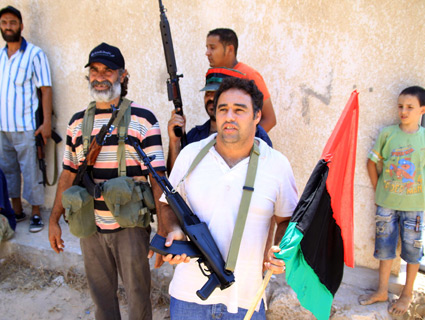By Sunday evening, the fighting in Libya was spreading to Tripoli, and the nation’s second largest city, Benghazi, appeared to be in the hands of the protestors. Over 200 people had been killed and hundreds more wounded by security forces, and Libyan leader Muammar Qaddafi’s son, Sayf al-Islam, was warning of civil war, and pledging that the government would “fight to the last bullet” to stay in office.’
The Libyan protests have been inspired by the wave of uprisings across North Africa, but they grow out of deep-seated poverty, unemployment, and political repression at the hands of yet another entrenched despot. Whether they will result in Libya achieving the sort of change experienced by Tunisia and Egypt is impossible to say, but early signs indicate that whatever the outcome, a high price is likely to be paid in human life.
Complicating matters is Libya’s unusual position in world affairs. Not long ago it was a pariah nation. But since 9/11, it has wormed its way back into favor with the United States and Europe because Qaddafi joined the war on terror, cooperating in the Lockerbie bomb investigation, coming down hard on al Qaeda, and kicking out terrorists he had once sheltered. At the same time, he has steered Libya into an increasingly powerful position in world politics because of its vast oil reserves. Libya has an especially close relationship with its former colonial master, Italy. It now provides about 20 percent of all Italy’s oil imports and has invested in sizeable amounts in that country’s energy infrastructure including the transnational energy giant ENI.
Along with their energy deals, Italian Prime Minister Silvio Berlusconi and Qaddafi have agreed to work together to stem the increasing numbers of migrants seeking a better life in Europe. In addition to those leaving from North Africa, thousands more have been moving up the Red Sea from Eritrea, Sudan, Somalia and other countries. Their point of entry is Italy–specifically, the small Italian island of Lampedusa, which lies in the Mediterranean midway between Libya and Sicily.
In 2009, Qaddafi and Berlusconi made an agreement that became part of an open and often vicious campaign against migrants: Libya would try to keep them from leaving in the first place; if they got out, Italy would send them back to Libya without providing them a chance to make asylum claims.
Human Rights Watch has documented the attacks on migrants in a detailed report called Pushed Back, Pushed Around: Italy’s Forced Return of Boat Migrants and Asylum Seekers, Libya’s Mistreatment of Migrants and Asylum Seekers. Here is but a brief account of the two nations in action:
Many of the worst abuses reported to Human Rights Watch occurred after failed attempts to leave Libya. One of the migrants, “Pastor Paul” (all names have been changed), a 32-year-old Nigerian, told Human Rights Watch how Libyan authorities brutally treated him when the Libyans stopped his boat shortly after it left Libya on October 20, 2008:
“We were in a wooden boat, and Libyans in a [motorized inflatable] Zodiac started shooting at us. They told us to return to shore. They kept shooting until they hit our engine. One person was shot and killed. I don’t know the men who did the shooting, but they were civilians, not in uniforms. Then a Libyan navy boat came and got us and started beating us. They collected our money and cell phones. I think the Zodiac boat was working with the Libyan navy. The Libyan navy took us back in their big ship and sent us to Bin Gashir deportation camp. When we arrived there, they immediately started beating me and the others. They beat some of the boys until they could not walk.”
The recent unrest in Tunisia launched a wave of 4,000 new migrants to Lampedusa from that country. They are being held in Italian refugee camps; but if similar numbers arrive from Libya, they will likely be summarily–and brutally–shipped home.
In the past, Qadaffi has patched up internal unrest and smoothed over human rights abuses by distributing more money from energy profits, while calling on Europe and the United States to go easy on their new “ally.” Those on the right, in particular, are inclined to do so because he is a stalwart in the war on terror and an effective force in blocking immigration. Which may well influence how Europe and the United States react to the anti-Qadaffi uprising in Libya.












